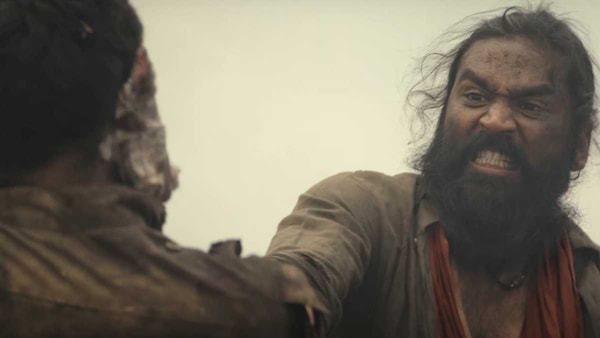Captain Miller movie review: Dhanush delivers a powerful performance in this solid drama
Captain Miller may be set in the period of the British Raj, but the themes, concepts and issues that it deals with feel timely and relevant.

Last Updated: 06.16 PM, Jan 12, 2024
Captain Miller movie story:
Captain Miller tells the tale of a former member of the British Indian Army who turns against the Empire after a life-changing incident.
Captain Miller movie review:
In Captain Miller, Analeesan aka Captain Miller (an excellent Dhanush) never kills a British soldier with a single bullet. He usually empties the entire magazine of his automatic rifle. He keeps pumping bullets into the Britishers even after recognizing that life has long departed their bodies. When engaged in the brutal act of slaughtering members of the imperial forces, Captain Miller enters a trance-like state. It raises questions about his motives—is he expressing profound disdain for the oppressors, or does his indiscriminate bullet expenditure serve as a desperate plea for help? Perhaps, deep down, he yearns for someone to stop his relentless killing spree, offering help in unravelling the senseless brutality he finds himself entangled in.
ALSO READ: Did you know Dhanush's Captain Miller connection with Hollywood classic Saving Private Ryan?
Typically, heroes in movies that delve into the unspeakable atrocities committed by the British Raj are driven by a higher purpose —fighting for the liberation of the nation and shielding their compatriots from the ruthless oppression of the British military. However, the story of Captain Miller is different. It's a story of a man who is constantly in search of his own identity.
Analeesan joins the British army because, in India's feudal society, he is treated like less of a human. He and the people of his community are not allowed to step into the very temple they built, stripped of rights and respect, and subjected to relentless humiliation, torture, and degrading practices, including the prohibition of wearing footwear. Already burdened by oppression, Analeesan is less disturbed by the additional maltreatment from the British. Instead, it is the once-dominant kings and nobles, who held sway in the country for centuries, that now experience the bitter taste of oppression under British rule.
"The British will give me respect and boots to wear," Analeesan argues while justifying his decision to join the imperial army, against the advice of his elder brother Sengolan (Shivarajkumar). After joining the army, Analeesan is rechristened as Miller to spare the British officers the challenge of pronouncing Indian names.
Soon Miller is faced with an unsettling reality, which he overlooked in his rush to join the army. The British Empire now expects him to crush his countrymen with the very boots that it gave him. Miller is asked to indiscriminately fire on peacefully protesting Indians. That massacre shatters Millers on the inside and leaves him traumatised for life. He is now torn between two identities: a disgraced Indian who killed his own countrymen and a renegade British soldier. The rest of the film follows Analeesan aka Miller's journey as he navigates a war-ravaged nation looking for answers to some existential questions.
It's perhaps the first time, a filmmaker has tried to show the freedom struggle against the British through the eyes of an oppressed class. The film evokes a very profound question, while the fight for freedom from the imperial forces ended long ago, has every oppressed Indian truly attained freedom in the present?
In Captain Miller, the war against the oppressor is not led by a man driven by any particular ideology, but by personal trauma. The oppression and ensuing violence are ugly. There are no winners in a war and yet we continue to inflict this pointless and senseless pain upon each other.
Filmmaker Arun Matheswaran is mastering the art of using minimalist designs to create maximum impact. Instead of spending fortunes in recreating the structures of British India, he has cleverly opted to shoot across barren lands, magnifying the elements of the Western genre. Composer GV Prakash Kumar compliments Arun's minimalist vision with a musical score that mimics Ennio Morricone's Western classics.
Dhanush infuses the narrative with a wild energy channeling the pain and trauma of Analeesan and Captain Miller into every fiber of his performance. Arun also makes sure that all other characters get their moment to shine on screen even though it is Dhanush's show all the way. Shivarajkumar delivers one of the most understated performances of his career, portraying a freedom fighter inclined towards peaceful protest rather than violent methods. Sundeep Kishan, Priyanka Arul Mohan, Aditi Balan, John Kokken, Elango Kumaravel and Nivedhithaa Sathish all make a solid impression with their performance.
Captain movie verdict: Captain Miller may be set in the period of the British Raj, but the themes, concepts and issues that it deals with feel timely and relevant.
Subscribe to our newsletter for top content, delivered fast.

